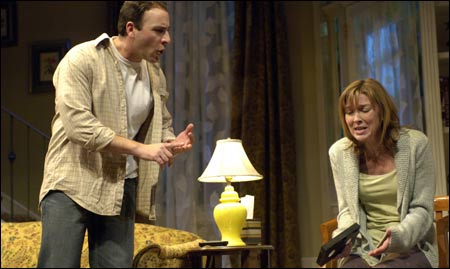Rabbit Hole from the Huntington; Twelve Angry Men at the Colonial
By CAROLYN CLAY | November 13, 2006
When the author is David Lindsay-Abaire, what you expect from a play called Rabbit Hole is Alice, not astrophysics. So this carefully calibrated, painfully funny domestic drama — in which slim comfort arrives in contemplation of the cosmos — comes as a surprise on the heels of the wildly whimsical Fuddy Meers, whose heroine awakes every day with amnesia, and Kimberly Akimbo, in which a teenager has a disease that causes her to age at the rate of ripe Stilton. In contrast to the wacky, dysfunctional fantasias on which South Boston native Lindsay-Abaire has made his name, Rabbit Hole (presented by the Huntington Theatre Company at the Boston University Theatre through December 3) is, for all its allusion to parallel universes, solidly set on planet Earth — Larchmont, to be precise. And it represents both a step forward and a step back for the playwright, whose imaginative earlier works are more theatrical but also more arbitrary. It’s as if Craig Lucas had gone to bed and awakened as Donald Margulies.

RABBIT HOLE: For all the allusion to parallel universes, David Lindsay-Abaire’s play is set solidly in Larchmont. |
Rabbit Hole, Lindsay-Abaire’s first play to be presented on Broadway, was nominated for a 2006 Tony; the poignantly acted, nicely manicured Huntington staging marks its area premiere. At the center of the drama are affluent, intelligent suburban couple Howie and Becca, whose marriage is under strain in the wake of unspeakable loss, information about which is reeled out like fishing line. In the first scene, we meet Becca in her grand-scale kitchen crisply folding laundry as freewheeling sister Izzy recounts a bar fight. Inch by inch, Izzy’s tale of decking a woman who harassed her in a tavern turns into the revelation that Izzy is pregnant by her musician boyfriend. And inch by further inch, we learn that the tiny clothes Becca is boxing used to belong to her four-year-old son, who eight months earlier was killed by a teenage driver after chasing the family dog into the street.
The most wrenching thing for Becca and Howie, obviously, is the loss of their child. But second is the couple’s inability to comfort each other. Manhattan broker Howie clings to his memories like a lifeboat, waking up in the night to watch home movies in the dark, whereas Becca sets out to erase every painful reminder from the surface of their life. He is painfully, even lugubriously in touch with his sorrow; hers is spikier and easily turned to anger. They aren’t even sinking in the same ocean, and Becca’s relatives — the kooky sister whose egotism is a good-natured elephant in the room and a blunt mom whose attempt at advice turns into a tangential rant on the curse of the Kennedys — are no rescue team. Throw in the awkward, hurting teenager who ran over the kid and sends Emily Post–polite pleas for absolution and the bereaved couple have their hands full.
 Topics
Topics:
Theater
, Entertainment, Science and Technology, David Lindsay-Abaire, More  , Entertainment, Science and Technology, David Lindsay-Abaire, Reginald Rose, George Wendt, Richard Thomas, John Tillinger, Kimberly Akimbo, Roundabout Theatre Company, Business, Less
, Entertainment, Science and Technology, David Lindsay-Abaire, Reginald Rose, George Wendt, Richard Thomas, John Tillinger, Kimberly Akimbo, Roundabout Theatre Company, Business, Less 